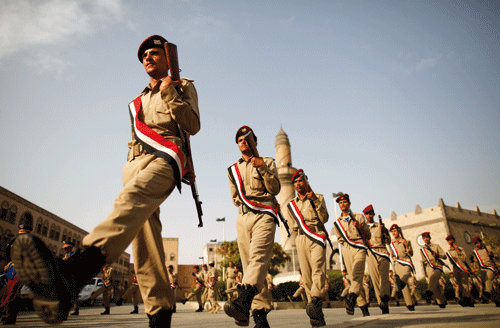In gangster movies, a classic scene is for a mafia boss to greet someone warmly with his right hand, then wink to one of his bodyguards on the side and say “kill him”. Minus the cinematography, this is how many Yemenis perceive the international community’s role in the transition of their country today.
Earlier this year, Yemenis generally welcomed the role of the international community — via the Gulf Cooperation Council (GCC) sponsored deal that saw former President Ali Abdullah Saleh exit power and thereby avert an imminent civil war — because they thought it paralleled their national interest. Since then, however, the realization has come for many that the international community’s commitment to Yemen’s interests, unity, democratic development and prosperity does not extend beyond press releases; rather, foreign powers now seem to be paralyzing progress and hijacking Yemen’s nation building.
Publicly, Western countries, the GCC and others have voiced much hope — as have Yemenis — in the country’s National Dialogue conference, which is meant to bring together representatives from all of Yemen’s various groups and factions to come up with a road map for the country’s future. To this end the international community has provided political and technical support, mainly through United Nations agencies, to prepare for the conference (previously scheduled for mid-November, but now postponed to a later date). However, other actions (and inactions) by foreign powers are at the same time sabotaging this attempt at national reconciliation.
Powerful local stakeholders — including former President Saleh himself, the influential Ahmar tribe, and others — remain able to hinder the country’s transition in order to preserve their own power, and while the United Nations Security Council (UNSC) has threatened them with sanctions, none have been forthcoming. In fact, member countries of the UNSC continue to actively deal with these sorts of local players. The GCC-sponsored agreement this year also succeeded, in large part, because it went out of its way to address the concerns of powerful local players, rather than the concerns of average Yemenis; this had the effect of empowering these divisive groups with local clout that they will be able to exercise at the upcoming national dialogue.
One of the Yemeni revolution’s core goals was the restructuring of the military, which became a key article in the GCC deal. The United States has taken a lead role in this task, but in such a way that the Yemeni military is looking more like an extension of the US army in Yemen. This is both because of an intense American public relations campaign, as well as the Yemeni military’s facilitation of un-manned American drone strikes and US and British special operations in parts of Yemen under the guise of ‘counter-terrorism’.
Whatever the military justification, American drone strikes have killed hundreds of civilians and injured many more. Yemen’s new president, Abdu Rabbu Mansour Hadi, rather than condemn the strikes has in fact endorsed them, marring his legitimacy amongst Yemenis and making him look like an American puppet. That he reports to the ‘international community’ that brought him to power, rather than his citizenry, is a definite problem. Hadi remains, however, generally favored among the population relative to possible alternatives; his presidency, along with the appointment of Morocco’s Jamal Benomar, a former human rights campaigner, as UN envoy to Yemen, constitute the most positive initiatives of the international community to date.
US support for the “Public Committees”, or civilian militias, in South Yemen, is also dangerously shortsighted. While America’s aim is to enlist local help in the battle against Al Qaeda in the Arabian Peninsula, supporting powerful non-state actors and armies implicitly undermines the state, especially in South Yemen where there is a fervent secessionist movement that will turn that same support against the central government.
South Yemen is also now a battleground in a wider geopolitical struggle. The frequency of sectarian clashes — mainly between Houthi groups and the Islah (or Muslim Brotherhood) — have been on the upswing as Iran and Saudi Arabia escalate their proxy war through local tribal and political groups, each offering cash, support and media backing.
With all this foreign money flowing in, one has to wonder why humanitarian aid organizations in Yemen are still suffering a funding crisis, reporting that cumulatively they have less than 50 percent of the cash they need to run their operations; this leaves, among other things, 10 million Yemenis going to bed hungry every night.
There is little wonder why then, when the international community comes with its hand extended, Yemen braces for the wink.








